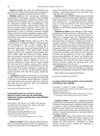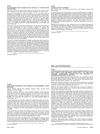6 citations,
April 2005 in “Journal of dermatological science” The study found nine new hair protein genes in human hair follicles.
4 citations,
December 1994 in “PubMed” A woman’s skin bumps healed almost completely with tretinoin cream after a leg infection.
 December 2022 in “Journal of Phytonanotechnology and Pharmaceutical Sciences”
December 2022 in “Journal of Phytonanotechnology and Pharmaceutical Sciences” Ayurvedic treatment helped a woman with PCOS become pregnant and have a healthy baby.
[object Object]  October 2007 in “Current Respiratory Medicine Reviews”
October 2007 in “Current Respiratory Medicine Reviews” Women with PCOS are much more likely to have sleep problems and should be checked for them.
 1 citations,
August 2021 in “Frontiers in Genetics”
1 citations,
August 2021 in “Frontiers in Genetics” Certain genes related to sulfur metabolism are more active during the growth phase of Cashmere goat wool, and melatonin might help this process.

Botox is effective for urinary incontinence, chronic migraines, and male pattern hair loss, and a new test for Botox antibodies is more humane.
 6 citations,
January 2013 in “Journal of Clinical and Diagnostic Research”
6 citations,
January 2013 in “Journal of Clinical and Diagnostic Research” AMH levels are higher in women with PCOS and can indicate the number of small follicles in their ovaries.
 78 citations,
February 2011 in “Canadian Medical Association Journal”
78 citations,
February 2011 in “Canadian Medical Association Journal” Acne treatment varies, with topical and systemic therapies effective, and more research needed on treatment order and long-term effects.
 16 citations,
March 2005 in “Journal of The American Academy of Dermatology”
16 citations,
March 2005 in “Journal of The American Academy of Dermatology” A boy with Sjogren-Larsson syndrome has skin and muscle symptoms due to a specific enzyme deficiency.
 3 citations,
March 2005 in “Journal of the American Academy of Dermatology”
3 citations,
March 2005 in “Journal of the American Academy of Dermatology” The lotion and shampoo effectively treated scalp seborrheic dermatitis.
 212 citations,
May 2010 in “American Journal of Obstetrics and Gynecology”
212 citations,
May 2010 in “American Journal of Obstetrics and Gynecology” Diagnosing PCOS in teenagers is challenging and should use strict criteria to avoid misdiagnosis and unnecessary worry.
 May 2021 in “Journal of the Endocrine Society”
May 2021 in “Journal of the Endocrine Society” A rare ovarian cancer with a good outlook was found in a woman with unusual hair growth and abdominal symptoms.
 83 citations,
July 2008 in “Current Opinion in Chemical Biology”
83 citations,
July 2008 in “Current Opinion in Chemical Biology” The document concludes that understanding sulfation biology is crucial for creating treatments due to its importance in biological functions and disease.
 90 citations,
December 2007 in “Current Oncology”
90 citations,
December 2007 in “Current Oncology” Non-hormonal treatments should be used first for sexual dysfunction in postmenopausal breast cancer patients on aromatase inhibitors, with hormones as a second option.
 38 citations,
May 2006 in “Archives of Gynecology and Obstetrics”
38 citations,
May 2006 in “Archives of Gynecology and Obstetrics” Women with only irregular periods or excess hair have a better hormone profile than those with full PCOS, but both groups are similar, indicating a need for better PCOS diagnosis methods.
 37 citations,
January 2004 in “Hormone Research in Paediatrics”
37 citations,
January 2004 in “Hormone Research in Paediatrics” About 3% of high school girls aged 14-18 in Isfahan, Iran, have polycystic ovary syndrome.
January 2021 in “Indian journal of veterinary pathology” A 15-year-old female labrador had a large ovarian tumor removed.
 March 2023 in “Pediatrics & neonatology”
March 2023 in “Pediatrics & neonatology” A baby girl had two brain-related growths removed and is developing normally.
2 citations,
July 2013 in “Journal of Animal Physiology and Animal Nutrition” Shorthaired and hairless cat breeds excrete more felinine than longhaired breeds.
[object Object] 16 citations,
March 2011 in “Ophthalmic genetics” A patient with Birt-Hogg-Dubé Syndrome also had choroidal melanoma, suggesting the need for careful eyelid exams in such patients.
 December 2024 in “Medical Review”
December 2024 in “Medical Review” Organoids help study and treat genetic diseases, offering personalized medicine and therapy testing.
 30 citations,
January 2019 in “Clinical Endocrinology”
30 citations,
January 2019 in “Clinical Endocrinology” The study concluded that both anti-Mullerian hormone and LH/FSH ratio are higher in women with PCOS and combining these markers with BMI could improve diagnosis accuracy.
 1 citations,
January 2019 in “Springer eBooks”
1 citations,
January 2019 in “Springer eBooks” Hidradenitis Suppurativa is a chronic skin condition best treated early with surgery for better outcomes and less recurrence.
1 citations,
January 2022 in “Clinical dermatology review” A young man's cheek papule was identified as a benign hair follicle tumor using a skin surface microscope.
 6 citations,
August 1991 in “Pediatric Clinics of North America”
6 citations,
August 1991 in “Pediatric Clinics of North America” The document concludes that various hair and scalp disorders in children have specific treatments and proper diagnosis is essential.
1 citations,
July 2021 in “Acta dermatovenerologica Croatica” Adalimumab significantly improved symptoms and quality of life in two patients with Hidradenitis Suppurativa.
December 2021 in “Pathologica” Trichogerminoma is a rare, benign skin tumor from hair cells, with a small risk of becoming cancerous.
 November 2018 in “International Journal of Current Pharmaceutical Research”
November 2018 in “International Journal of Current Pharmaceutical Research” PCOS is a hormonal disorder causing symptoms like irregular periods and acne, and increases the risk of diabetes and heart disease.
 January 2015 in “International journal of reproduction, contraception, obstetrics and gynecology”
January 2015 in “International journal of reproduction, contraception, obstetrics and gynecology” Women with PCOS often have irregular periods, a higher chance of infertility and miscarriages, and may improve fertility with lifestyle changes and treatment.
 1 citations,
July 2022 in “International journal of homoeopathic sciences”
1 citations,
July 2022 in “International journal of homoeopathic sciences” Homoeopathic treatment may help manage polycystic ovarian syndrome.





















